Ten Arguments For Deleting Your Social Media Accounts Right Now
£7.00£9.50 (-26%)
Social media is supposed to bring us together – but it is tearing us apart.
‘A blisteringly good, urgent, essential read’ Zadie Smith
The evidence suggests that social media is making us sadder, angrier, less empathetic, more fearful, more isolated and more tribal.
Jaron Lanier is the world-famous Silicon Valley scientist-pioneer who first alerted us to the dangers of social media. In this witty and urgent manifesto he explains why its toxic effects are at the heart of its design, and, in ten simple arguments, why liberating yourself from its hold will transform your life and the world for the better.
WITH A NEW AFTERWORD BY THE AUTHOR
‘Informed, heartfelt and often entertaining … a timely reminder that even if we can’t bring ourselves to leave social media altogether, we should always think critically about how it works’ Sunday Times
‘Indispensable. Everyone who wants to understand the digital world, its pitfalls and possibilities should read this book – now’ Matthew d’Ancona, author of Post-Truth
Read more
Additional information
| Publisher | Vintage (1 Aug. 2019) |
|---|---|
| Language | English |
| Paperback | 176 pages |
| ISBN-10 | 1529112400 |
| ISBN-13 | 978-1529112405 |
| Dimensions | 19.7 x 12.9 x 1.09 cm |

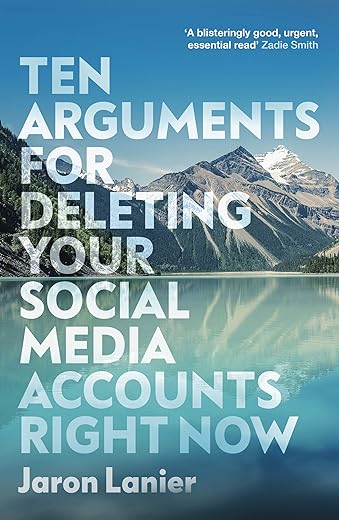
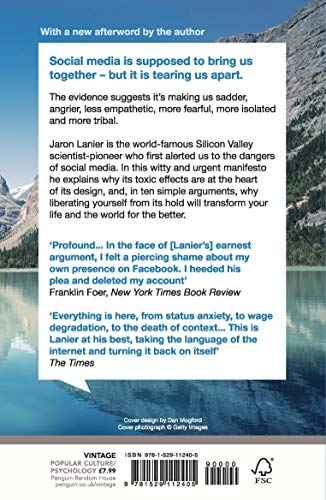


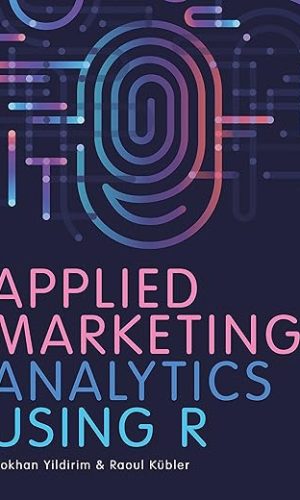



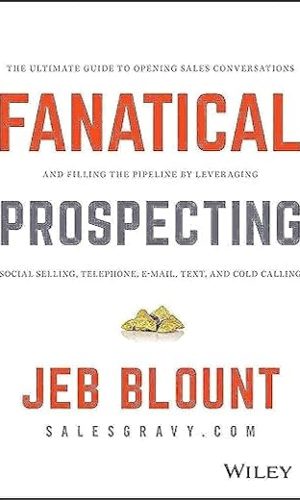
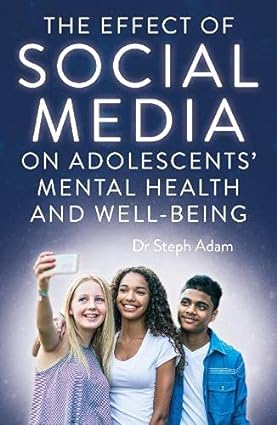
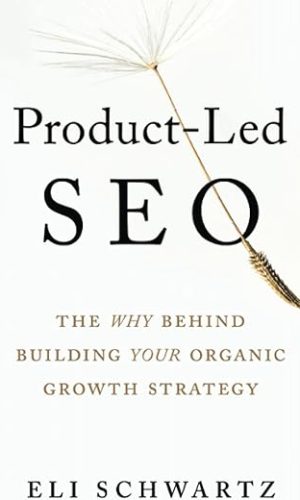
by Philmore East
I didn’t really need this book for myself (0 social networks, not even LinkedIn, only e-mail), but seeing my family members becoming hooked and now addicted made this book relevant (not that any of the arguments would help convince my daughter, unfortunately)
by Vayne77
“The problem isn’t any particular technology, but the use of technology to manipulate people, to concentrate power in a way that is so nuts and creepy that it becomes a threat to the survival of civilization. (p. 38)”
Jaron Lanier concisely provides ten arguments for you to delete your social media accounts in this well written book. He is not against the technology but is critical about the way it is (ab)used. There is not hate towards any of the companies or people and he believes that by deleting the social media accounts it will send a signal to reform. Toxic people on social media are not considered enemies by Jaron, but as victims of the whole system (even the former US president).
It is refreshing to see this kind of approach as in the end we’re all humans regardless of what our views are. The challenge that we now have is because of social media there is less understanding for each other because we no longer have the same information. Messages are fine tuned to you and what you see and experience is different than other people. Algorithms learn that negative messages work best to generate money so they are optimized for that. No one knows for sure how they are programmed as they are the most closely guarded secrets held by Facebook and Google.
Methods are used that are not fully understood to manipulate people on a large scale to do or not to do something. People are made to feel unhappy to keep them hooked and yet people don’t realize they are being manipulated. While it is fascinating to learn about it (and the book shared new insights), it’s also scary and it helped me to improve my online presence further and critically look at how my family is using technology.
The book relies mostly on internet sources and while the author provides URLs extensively, given their temporary nature – not all of them work anymore.
The message is clear though: there are no free services, if something is free it means you are the product and it becomes creepy when you, as a product, are being manipulated while not realizing it. The book helps to make you aware and it suggest to start with a six month’s break. Ultimately it is up to you to decide though :-).
by Kwamina
I deleted Facebook, LinkedIn, Twitter and Instagram after reading Cal Newport’s Deep Work. I’d always had a lingering antipathy towards those services, as I’d sensed that they insidiously seized my time – not only without my consent, but with my permission! Before reading Cal Newport’s lauded, though sometimes lampooned, tract on working deeply, it’d never occurred to me to actually examine my own relationship with social media. Well, I was quickly swayed, and after reading Deep Work it was soon apparent that social media was harming me, rather than helping me. Ever since I’ve quit social media, I’ve been a happier and more productive person. If only someone had encouraged me sooner.
Jaron Lanier wants to encourage you right now. Ten Arguments For Deleting Your Social Media Accounts Right Now (which I’ll abbreviate to Ten Arguments, thank you very much!) is Lanier’s 4th book. As one of Virtual Reality’s prime movers, Lanier is perhaps silicon valley’s most respected Jeremiah. Based on his tech credentials, you might guess that Lanier champions social media. He doesn’t. Ten Arguments is his attempt to get everyone to shed it.
Before opening the book, its front cover immediately entices with a visual metaphor. There’s a scene of outstanding beauty – the reflection of an azure sky in the foreground, with snow-capped mountains in the distance – rudely interrupted by a chat bubble. It feels like a statement that any interaction with nature needs some commentary mediated by social media, even if that interaction materialises in the form of a pretty picture on a book cover. A statement about the pervasiveness of social media then, and the fact that it’s everywhere, even on the cover of a book which is about discouraging you from using social media. Very meta.
Lanier proceeds to make a forceful case through 10 arguments. Lanier is always sweet and likeable, both in writing and videos, though he’s sometimes indulgent. Ten Arguments is notably less self-indulgent than his previous works. If his renowned sesquipedalian* prose has irked you before, you’ll be pleased to know that he’s relatively plain and direct in his writing here. Besides the odd** acronym, the prose in Ten Arguments isn’t as circuitous as it’s been in Lanier’s previous works. The arguments are:
1. You are losing your free will
2. Quitting social media is the most finely targeted way to resist the insanity of our times
3. Social media is making you into an asshole
4. Social media is undermining truth
5. Social media is making what you say meaningless
6. Social media is destroying your capacity for empathy
7. Social media is making you unhappy
8. Social media doesn’t want you to have economic dignity
9. Social media is making politics impossible
10. Social media hates your soul
Lanier’s arguments often incorporate what he groups as BUMMERs. I won’t spoil the acronym here. But he includes Google, Facebook and to a lesser extent Twitter within that group of BUMMERs, alongside a few others. All of the arguments are targeted at BUMMERs.
Many of the arguments feel as though they were written for an audience of citizens, rather than individuals. The risk an activity poses to society might not dissuade individuals from contributing to a particular activity, and in this book, it sometimes feels as though Lanier has confused the societal drawbacks of using social media with personal ones. This is isn’t a serious flaw, but Ten Arguments For Us All Deleting Social Media Accounts Right Now probably would’ve been a more accurate title.
Speaking of the arguments, some of them are stronger than others. Let’s look at a weaker argument first: I found the suggestions raised in Argument 8 – “Social Media Doesn’t Want You To Have Economic Dignity” problematic. Lanier suggests that we directly monetise services like search and social media, and that within that system, users earn money on the basis of their contributions, provided those contributions are popular. So, sort of like a subscription model, but with a reciprocal financial component for subscribers.
I find this problematic because once you’re monetising on the basis of subscription, you’ve changed the revenue model. In our current system, BUMMERs offer services for free to attract people. People are attracted to those services and provide data by using them. Data is then the crude oil which is refined and then sold on to advertisers, and that’s how BUMMERs make their money.
In Lanier’s proposed subscription model, the popularity of your posts wouldn’t increase revenue unless your posts resulted in more people adopting subscriptions for the given services, so I’m not sure why BUMMERs would feel inclined to pay users for their contributions. It wouldn’t make financial sense for them to. Remember, according to this suggestion, we’ve stripped away the whole ad-revenue model, and so in theory, popularity (which is really only useful as “engagement”) doesn’t matter any more. Subscriptions do.
Furthermore, Lanier partially concludes the argument with “It just isn’t right to tell people they are no longer valuable to society when the biggest companies exist only because of data that comes from those same people”. I’m an economic layperson, so take everything I’ve just said with a huge grain of salt – but I have a slight problem with this too. Yes, the companies only exist because of the data that comes from those same people, but as Lanier alludes to throughout the book, the monetary value these companies accrue comes from their ability to use that data to modify behaviour and provide services to advertisers. I’m on board with the underlying sentiment, and the overall sense that we should try to create a fairer way to redistribute the spoils of mass data mining, but this argument in particular wasn’t a very strong one for me.
Okay, now the stronger arguments: “You are losing your free will”, “Social media is destroying your capacity for empathy” and “Social media hates your soul arguments” were all persuasive and passionate. If you only read one argument in the entire book, I recommend that it’s the one on free will, as that’s the most gripping argument for both citizens and individuals.
Arguments aside, there are more things that the book could’ve covered, and there aren’t many compelling solutions to accompany the plea to delete social media accounts. When I’ve spoken to people about my own experience deleting social media accounts, they tend to ask me questions like “How’d you keep up with events?” and “Don’t you miss out on things?” or “How’d you stay up to date?”. In fact, if you speak to people about social media, and you’ll soon discover that most people aren’t in love with it. They dislike it, and often want to it quit too. It isn’t hard to persuade people that social media is deleterious. It is however, very hard to persuade people that social media is not indispensable. On that basis, Lanier was a little remiss to not explore these common objections and queries a little further. So, prospective reader, you should know that Ten Arguments is more of a polemic than it is a primer. For practical guidance on actually getting by with substantially less / no social media at all, I highly recommend Catherine Price’s How to Break Up with Your Phone.
Back to Ten Arguments. In the wake of the Cambridge Analytica scandal, Russia’s alleged tampering of the recent US presidential election, revenge porn, tribalism and tax avoidance, this book is important. It is a civic duty to examine your (yes, YOU!) relationship with social media given our present zeitgeist, and that’s precisely what Ten Arguments forces you to do. With that in mind, think of Ten Arguments as an examining body, and take an opportunity to examine your relationship with these “indispensable” services, and the impact of your relationship on society, by reading this book.
4*
*I’m aware of the irony here
**I’m aware of the double entendre here